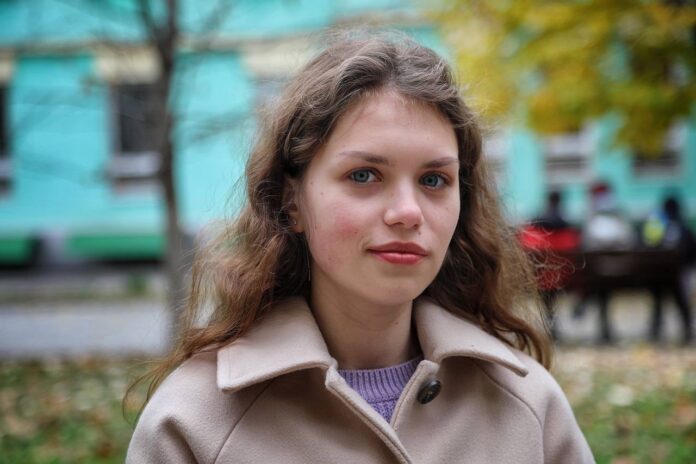KHERSON, Ukraine — The first yellow and blue flags went up in Kherson at about 11 a.m. on Nov. 11, as the Ukrainian army was on its way to end the Russian occupation.
It had been 256 days since Ukraine’s flag had flown over the city.
During that time, residents were forced to hide their Ukrainian identity from the soldiers sent by President Vladimir Putin to annex Kherson and make it a part of Russia.
They lived under constant fear, and even avoided speaking Ukrainian, said Olena Poliakova, a 21-year-old student who remained in Kherson throughout the occupation.
“Ukrainian language and symbols started to be forbidden in the city,” she said in an interview.
“No one was happy to see Russians here.”
Ukrainians show their flag in Kherson following the defeat of Russian forces.
Emile Ghessen
The victory was hard-earned.
Olena Litvinova said five of her friends were taken from their homes with bags over their heads. The Russians held them for for 48 days and beat them, she said.
“They said one of them was a military spotter,” she said.
The conflict with Russia has shadowed Litvinova. She moved to Kherson when the Russians took over Ukraine’s Donetsk region in 2014, she said.
Read more:
On Ukraine backroad, children’s bodies and wreckage of civilian convoy shelled by Russians
After the Russians rolled their tanks into Kherson, she said she felt the pressure to suppress her Ukrainian identity.
“At the beginning we didn’t hide anything, but when soldiers started walking into buildings and searching, we took our gold, documents and Ukrainian flags to a safer place,” she said.
Those days are over now. Walking in the city this week with her husband and daughter, Olena Yankovska proudly wore a Ukrainian ribbon on her bag.
She made it herself out of one her daughter’s ribbons “to show my support for our liberation,” she said.
4:06
Kherson villagers cheer, give flowers as Ukrainian soldiers arrive after Russian withdrawal
During the months of occupation, the family steered clear of the Russians. To avoid getting dragged into a sham referendum staged by Moscow, they did not show their passports or disclose their surnames.
“We didn’t take Russian SIM cards. If we took them, we will need to leave a copy of our documents with them, which we didn’t want to do,” said Olena’s husband, Oleh.
In order to collect pensions, social benefits or humanitarian aid, residents had to give the Russian administration their personal information, which was later used during the referendum on joining Russia, he said.
“From our circle, no one went to vote. And the referendum happened unexpectedly for us. We received information that it would happen only one day before,” he said.



